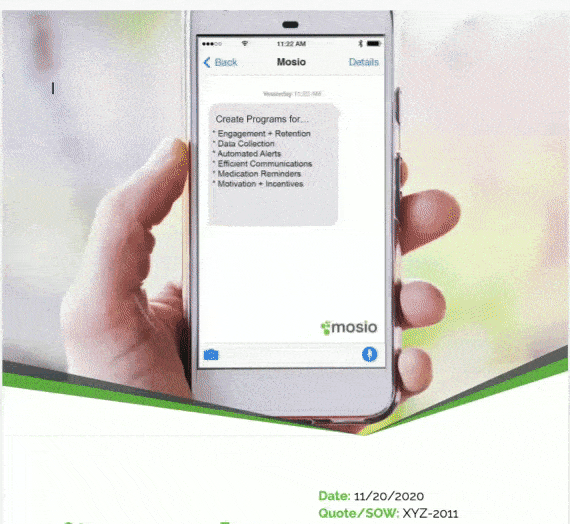
Photo by Tristan Gassert on Unsplash
Are You Still Not Using Text Messaging for Dosing Reminders in your Clinical Trials?
Until today, clinical trials continue to be costly and long in duration in spite of various novel initiatives that have taken place to improve their efficiency and data quality. While biopharmaceutical companies are trying out RBM, adaptive trial designs, and novel pilots, the entire industry seems to be missing out on the crucial aspect of patient non-adherence. According to a pharmacology report, nearly 40% of patients become non-adherent to the investigational medical product (IMP) after 150 days in a trial.
As such, this non-adherence, apart from other issues, also brings data variability into the equation. An increase in data variability would mean that more patients need to be enrolled to achieve the study’s statistical output. To put it more clearly, a 20%-30% non-adherence rate will require a 50% bigger sample size to maintain an equivalent statistical power. As it’s quite obvious, this has a direct impact on the operational costs associated with clinical trials.
On the other hand, reducing the IMP non-adherence by even 1%, the study sponsor can save (or prevent) up to $336K in operational costs. So, what’s the best way to deal with patient non-adherence in clinical trials?
Text Messaging for Dosing Reminders:
Medication reminders via text message appear simple and basic on the surface, but when done correctly, can be programmed to be interactive to meet study protocol requirements. Medication reminders work because they require minimal effort from the patient: taking their medicine and where applicable, confirming they’ve done so. They help patients stick to their medication schedules and facilitate compliance for the entire study duration.
95% of Americans own mobile phones (with 77% owning smart phones) and 85% of people over 65+ own a mobile phone, making text messaging the ideal mobile channel for dosing reminders as well as any type of communications during clinical studies. The evidence of text messaging’s usefulness in reminding patients to take their medication is found in a number of studies. We’ve broken down a handful of them for you, below.
Mobile Text Messaging Improves Medication Adherence:
A study review which assessed the effects of text messaging in patients with cardiovascular disease on treatment adherence showed promising results. The 2016 study analyzed as many as seven trials with 1,310 study participants. All of the trials used either SMS or MMS to improve patients’ adherence to study medication. Six out of seven trials showed a beneficial effect of text messaging on adherence.
A 2014 study, which examined the efficacy of SMS reminders to improve antiretroviral adherence in HIV patients, demonstrated that mobile phone technology is an acceptable tool for enhancing adherence to the antiretroviral collection. This analysis had significant implications for the implementation of text messaging-based adherence interventions across southern parts of Africa.
Another study, which evaluated the effects of text messaging on medication adherence in chronic disease patients, showed that text messaging nearly doubled the odds of adherence to medications. This meta-analysis of randomized clinical trials showed that this increase translates into adherence rates from 50% to 67.8%, an absolute increase of 17.8%.
Finally, a 2017 study that was conducted to assess the impact of text messaging on cardiac medications among post-myocardial infarction patients led to an average of 14.2% improvement in adherence over usual care. The study also concluded that this technology provides a simple yet scalable method to ensure the consistent use of evidence-based therapies.
There is plenty of empirical evidence proving text messaging is the best tool for reminding patients to take their medicine in clinical trials. With global mobile coverage, the ubiquity of the text messaging channel, and cost effective solutions available, it’s time study sponsors paid attention to this simple, yet powerful technology as a way to improve patient adherence and compliance in research.
—
Are you looking to improve medication adherence, engagement, or retention in your research? If so, contact us for a free consultation, or you can get quick access to our pricing guide here.







